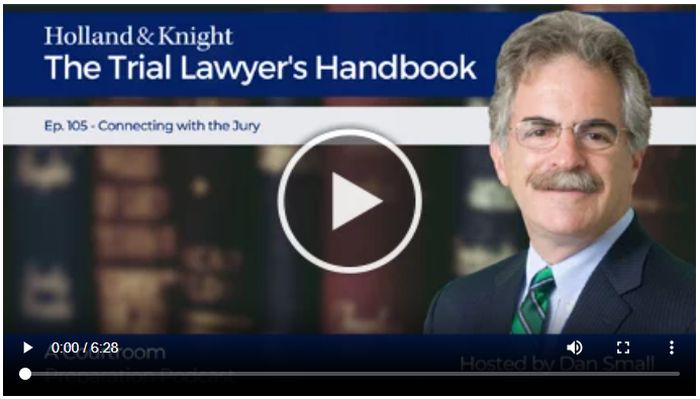- in United States
In this episode of "The Trial Lawyer's Handbook" podcast series, litigation attorney Dan Small explores the unique and challenging relationship between trial lawyers and juries, illustrated through his experience prosecuting the complex and emotionally charged Racketeering Influenced and Corrupt Organization Act (RICO) case against the Cammarata Organization. He highlights how, despite the inability to converse directly, subtle interactions, gestures and small moments — such as a mishap with a wrapped finger or a cheeky message to opposing counsel — helped build a connection with the jury during the grueling month-long trial. The episode emphasizes the importance of consistently striving to respect, engage and communicate effectively with jurors, reminding trial lawyers that every action, no matter how trivial it may seem, can influence how the jury understands and responds to a case.
Listen to more episodes of The Trial Lawyer's Handbook here.
This podcast episode was adapted from Mr. Small's book Lessons Learned from a Life on Trial: Landmark Cases from a Veteran Litigator and What They Can Teach Trial Lawyers.
Podcast Transcript
Dan Small: A trial lawyer's relationship with the jury is a strange one, isn't it? In what other situation are you together in a room with people for long hours – sometimes long days, sometimes long weeks or months – dealing with difficult issues, but unable to talk with each other? The jurors are trying to solve a puzzle using information you give them, but they can't ask you to explain or repeat anything. It's a strange and challenging situation, trying to develop a relationship when you can't even have a conversation.
And yet, it happens. If you work at it consistently, and if you're lucky, you can develop a bond with the jury. The Cammarata drugs and multiple-murder RICO case that we've been talking about in the most recent episodes that I prosecuted for the DOJ's Organized Crime Strike Force in Texas must have been a tough one for the jury for multiple reasons. It involved:
- disturbing and graphic testimony about cold-blooded murders
- confusing testimony about strange dealings in Lebanon
- bad guys turned government witnesses and good guys turned undercover agents
- Sam Cammarata's "I was just playing a role" informant defense
And much more. During the month-long trial, the jury worked hard. Nine to five was a short trial day for the judge, and the case was complex, contentious and ugly. And yet, slowly but surely, we bonded. It came out in small ways: in looks, in gestures and small incidents. Two funny examples.
The judge did not give long lunch breaks. After all, the marshals brought in lunch for the jury, so they were ready to go fairly soon. Each day, we lawyers would rush down the street to a restaurant for a quick bite. One day, late leaving the restaurant, I caught my finger badly in the closing door of the restaurant. We got back to the courthouse, and the guard at the door had an old army surplus first aid kit. I'm really not sure which war it was from, but it was quite a sight. It was the only thing available, so we hurriedly wrapped my finger in yellowed gauze and went back to work.
There I stood all afternoon, at the podium, questioning a key witness while holding my throbbing, badly wrapped finger. Finally, the court called a mid-afternoon break, and I attempted to re-wrap it while someone found me some aspirin or something. In the middle of which the lead jury marshal came out of the jury room, walked over to my table, leaned over with a smile, and whispered, "Mr. Small, the jury wants to know what you did to your finger?" So I told him.
The court reconvened, the jury filed back in, and one after another each of them gestured toward my finger (or to their finger) and smiled at my mishap. The pain continued throughout the day, but it was far outweighed by the pleasure of having made that small connection. The Texas Rangers finally brought me to the emergency room late that night. When I told the doctor there that it had happened at lunchtime, he said, "What the heck have you been doing that you didn't come in hours ago?" I smiled and I said, "I've been connecting."
Second example: The courtroom for the Cammarata trial was fairly narrow, which created a somewhat odd arrangement. Both counsel tables were near the jury box, with the government's table in front of the defense table. One in front of the other. This setup led to another connection. During one of the breaks, the jury marshal came up to me and quietly said: "The jury wanted you to know that defense counsel is trying to read your notes from behind you. They told me."
I was shocked, but again pleased that the jury cared. I didn't say anything to defense counsel, but when court reconvened I took out a fresh pad of paper and wrote in large letters, "HI BOB!" (not his real name, but I used his real name). Sure enough, at the next break, he came up to me quite upset and insisted, "I wasn't reading over your shoulder!" Well I hadn't specifically said that he was. And I took that as both a confession and assurance that he wouldn't try it again.
Find ways to connect with jurors. It's not always easy, but it's terribly important. Just remember, the jury is always watching. They have nothing else to do. They're always watching you and judging you. How do you treat people? Opposing counsel? Clients? Co-counsel? Staff? Whoever. How do you react to adversity or to triumph? What do you do to respect the burden on the jury? What do you do to help them to understand? Those questions should be a constant for any trial lawyer going to trial in front of a jury.
The content of this article is intended to provide a general guide to the subject matter. Specialist advice should be sought about your specific circumstances.


